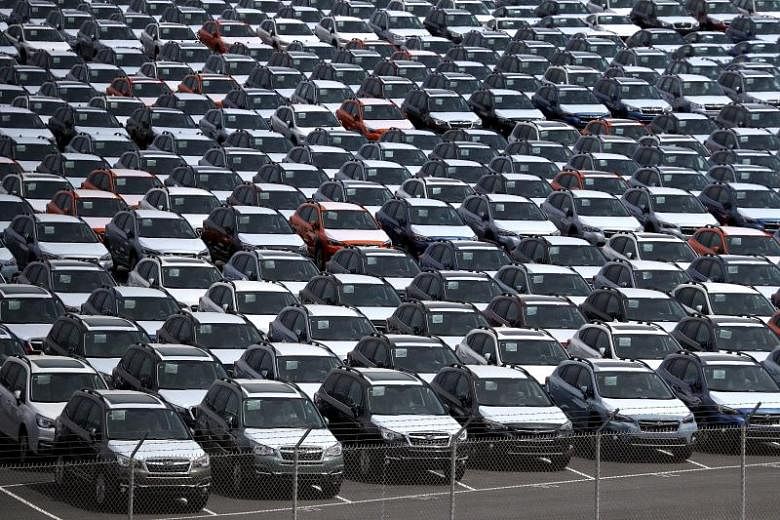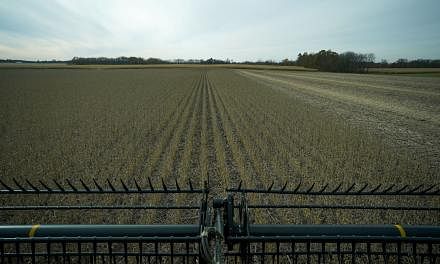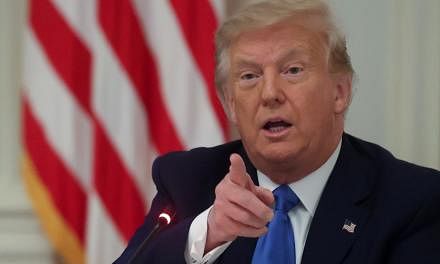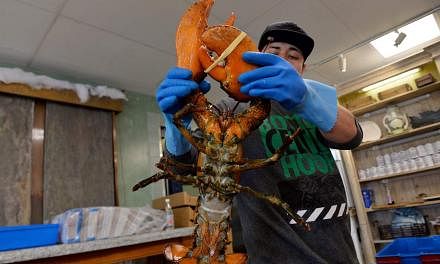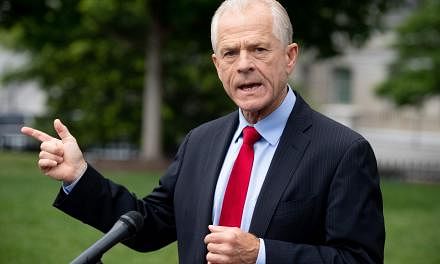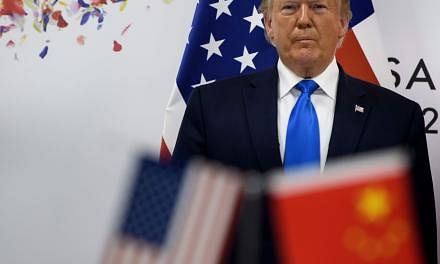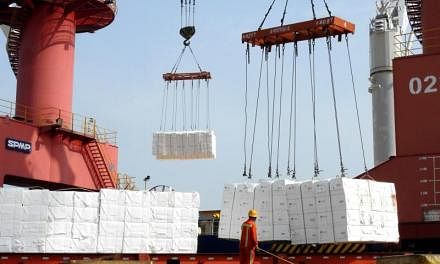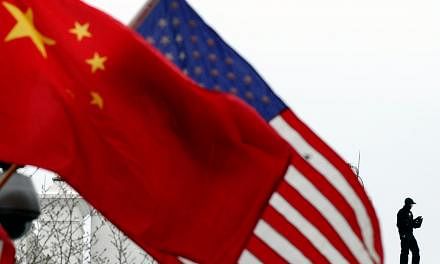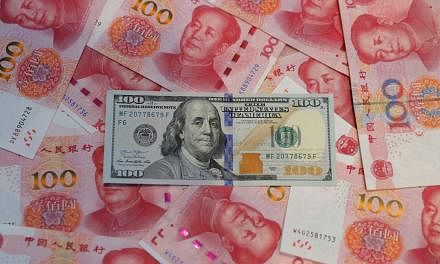WASHINGTON (NYTIMES) - US President Donald Trump agreed on Friday (May 17) to lift tariffs on metal imports from Mexico and Canada, removing a major irritant for two important allies that in exchange agreed to stop punishing American farmers with their own taxes on pork, cheese and milk.
At the same time, Trump postponed a decision on whether to impose tariffs on automobiles imported from Europe, Japan and other countries for six months, setting a tight deadline for the United States to reach trade deals that have so far proved elusive.
Together, the actions remove the threat of an all-encompassing global trade war and allow Trump to focus on pushing China to agree to the United States' trade terms, as well as pressuring Europe and Japan to reach a trade deal before the 2020 election.
His trade war has hurt many of the farmers who make up his political base, and he is eager to make good on a 2016 campaign promise to rewrite trade deals in America's favour.
"I'm pleased to announce we've just reached agreement with Canada and Mexico. We'll be selling our product into those countries without the imposition of tariffs," Trump said on Friday.
The US trade representative said in a statement that the metal tariffs would be removed and both Mexico and Canada "had agreed on the removal of all retaliatory tariffs imposed on American goods by those countries".
The easing of trade tensions in North America could give Trump more leeway as he pursues an ambitious trade fight with China, which has imposed tariffs on American products in retaliation for the president's levies on US$250 billion (S$344 billion) worth of Chinese goods.
Trump on Wednesday announced sweeping restrictions against Chinese telecom companies like Huawei, and he has threatened to tax all Chinese imports, prompting concerns from farmers and other businesses caught in the crossfire.
On Friday, it became clear that pressure to reach an accord with Canada and Mexico before the 2020 elections outweighed the president's affection for the steel and aluminium tariffs he imposed last year.
The metal tariffs are linked to a broader free trade agreement, the newly negotiated NAFTA, called the United States-Mexico-Canada Agreement. Trump had described the tariffs as a source of leverage in negotiating a revision to that deal, which has yet to be ratified by legislatures in all three countries.
But both Republicans and Democrats had said they would not sign off on that deal until the White House removed metal tariffs on Canada and Mexico. They argue that the levies are raising costs for American companies and consumers, and that Canadian and Mexican retaliation is hurting American farmers and businesses.
A congressional aide who has been involved in the talks between the three countries said the White House was growing increasingly sensitive to pressure from Republicans in rural states whose farmers have been suffering from reprisal that diminished their access to sell in neighbouring markets. Their problems were compounded when talks with China broke down this month, this person said.
Vice-President Mike Pence, who has spent weeks traversing Midwestern states to sell the new United States-Mexico-Canada Agreement in Congress, relayed the complaints of manufacturers and farmers hurt by the tariffs to Trump, telling him, "We've got to get moving on this".
While rescinding the metal tariffs will remove one important obstacle to the passage of the trade deal, others remain. House Democrats have insisted that the pact include more labour and environmental protections.
Speaker Nancy Pelosi, D-Calif., is in no particular rush to give the president a major domestic policy victory in 2020, according to people familiar with her views.
Jesús Seade, the undersecretary for North America at Mexico's Foreign Ministry, said he hoped that ending the dispute would give "an extra push" towards ratifying the agreement. Mexico will lift its retaliatory tariffs in a couple of days, he said.
Speaking from Stelco, a steel producer in Hamilton, Ontario, Prime Minister Justin Trudeau of Canada said Friday that the deal was "pure good news" and would help clear the way for the passage of the agreement.
"We are very optimistic we will be able to move forward in coming weeks," he said.
As the White House eased tensions with Canada and Mexico on Friday, it continued to pressure allies elsewhere, including Europe and Japan. Those governments are still not exempt from the steel and aluminium tariffs, and they are likely to bear the brunt of auto tariffs that could reach 25 per cent, should Trump opt to impose them.
The White House's announcement Friday of a delay in determining whether to impose levies on foreign automobiles delivered a temporary reprieve to global automakers and auto suppliers, which had been bracing for punishing tariffs on millions of cars imported into the United States each year. But it also set up a tense six-month period for the White House to reach trade deals with Japan, Europe and other nations that have already been complicated by mistrust and disagreements.
In a proclamation on Monday, Trump said that imports of foreign cars and car parts were causing harm to the American automobile industry and threatening national security and that other countries had 180 days to address the problem through trade agreements with the United States.
If agreements "to address the national security threat" are not reached, Trump said he would determine "whether and what further action needs to be taken," a step that could include imposing 25 per cent tariffs on foreign cars.
Car companies and industry groups said that a delay did not go far enough and that Trump should abandon any plan to impose car tariffs.
"The continued threat of tariffs on cars and auto parts only creates more uncertainty weakening our economy," said Neil Bradley, the executive vice president of the US Chamber of Commerce.
Many outside the administration have criticised the linkage of cars with national security, pointing out that the bulk of American auto imports come from the country's closest allies. Mexico, Japan, Canada, Germany and South Korea were together responsible for more than 85% of American automotive imports in 2018.
Canada and Mexico have negotiated exclusions to the car tariffs as part of their earlier trade negotiations, but it is unclear if car tariffs will affect other countries, including South Korea.
In a statement, Toyota called the White House's announcement "a major setback for American consumers, workers and the auto industry," saying that it "sends a message to Toyota that our investments are not welcomed, and the contributions from each of our employees across America are not valued."
"The idea that US automakers are threatened by automotive imports is fundamentally flawed and ill conceived," said John Bozzella, the president of Global Automakers, which represents foreign car brands.
"No automaker or auto parts supplier asked for this 'protection.'"
The United States has struggled to make headway in preliminary negotiations with the European Union, which has balked at Trump's demands to allow more agricultural products like chicken and cheese into Europe.
Trump has repeatedly criticized Europe for flooding the American market with cars while limiting imports of US vehicles, and has called for revised trade terms that make the relationship more fair. But he also previously rejected a more straightforward proposal from Europe to simply scrap automotive tariffs on both sides of the Atlantic.
Speaking to the National Association of Realtors on Friday at a Washington hotel, the president denounced the EU for putting up trade barriers to American farm products and cars.
"The European Union treats us, I would say, worse than China. They're just smaller," he said.
"They send Mercedes-Benzes in here like they are cookies." The European Commission said in a statement Monday that it would work constructively with American partners.
"Neither the US nor the EU can have an interest to enter a trade conflict."
The Trump administration wants Europe to buy more American farm products, like meat and dairy, and says a deal without agriculture will not pass Congress. But Europe insists that agriculture is not on the table.
Reaching a deal with Europe in six months could be difficult, especially given that elections for the European Parliament next week are expected to strengthen protectionist parties on both the left and the right.
Leaders of the Green coalition in Parliament say they will not sign trade agreements with countries that have not ratified the Paris climate change accord, which Trump has pulled out of.
The United States and Japan have also been discussing a bilateral trade deal that could give American farmers more access to Japan's market. But those talks, which began nearly two years after Trump pulled out of a multilateral trade deal with Japan known as the Trans-Pacific Partnership, also have yet to move beyond the initial stages.
Japanese officials say that they are counting on the close relationship between Trump and Prime Minister Shinzo Abe to keep trade negotiations from souring between the two countries.
Trump is scheduled to visit Japan next week, and his hosts are planning a full slate of high-level hospitality. That includes a state dinner with the new emperor and empress, rounds of golf and a visit to a sumo wrestling championship, where Trump will award the winner's trophy.
